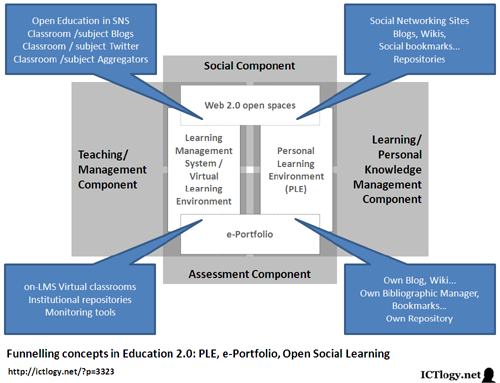This is a plead for equidistance and eclecticism. Based on:
- Being a teacher myself, and having to manage people, marks, syllabuses and on, I heavily rely on centralized solutions that I can barely imagine differently;
- being (in many aspects) a learner myself, I can’t help myself from the bounds that tie me to monolithic structures, and hence manage an open personal environment where knowledge (and learning) comes in many ways;
- constantly knowing and meeting other people like me (teachers and/or learners), it is just normal that our paths cross and our knowledge environments overlap and enrich one another;
- all that said, it is just normal that both as a professional and as a learner I need to assess and be assessed by everything that I do here and there, as learning in the Information Society knows no boundaries.
All these aspects concur in the educational process, though many of them make opposite forces, which is why some certify the death of the virtual learning environment while others consider it alive and kicking; some will seem to be putting all the eggs in the personal learning environment and/or open social learning, while maybe there is still room to reconsider e-portfolios.
All this gets more complicated if we take into account assessment or tracking knowledge acquisition along your whole life.
I increasingly believe that the solution to all this, and put in Simon Grant’s words, may perhaps be not a tool but several tools [and] a tool for bringing together evidence residing in different systems
. This is my go at the whole issue:
In general, I see two sets of opposite trends here:
- On the one hand, the dilemma between the management needs of teaching, which lead to centralization vs. the self-management needs of learning, which lead to de-centralization;
- on the other hand, the dilemma between the assessment needs, which lead towards individualization vs. the socialization needs, which lead towards openness.
Put these four issues one against the other one, I think we can clearly see that there are interesting intersections between them, and these overlaps are crowded with things that are already happening. What I’ve pictured is not exhaustive in any way, but it gives (me) an idea that “competing solutions” might not be as much of a solution as a hammer is an all-purpose tool.
- Traditional learning management systems (LMS) have long gone online and included (shyly, though, most of times) the social component by providing Web 2.0 tools or channelling third parties’ content through widgets and open APIs;
- on the other end, repositories and (hopefully, but very well yet) monitoring tools by means of which both the institution and the learner can access (and assess, if needed) the content of the latter;
- e-portfolios are, in many cases, the bridge between the “inside” and the “outside”, and I truly believe (or expect) that they will gain increasing importance in blurring the frontiers that still separate virtual learning environments from personal learning environments;
- last, but not least, personal learning environments do also have a social component, which in its other “end” is linked with virtual campuses, thus closing the circle.
In my opinion the debate of centralization vs. decentralization is not an either-or-debate, but a puzzle that will be solved by weaving the appropriate (and surely complex) tapestry. And I wonder whether the tools (the needles and the clothes, the open APIs and the widgets and the XMLs) are already there, and what lacks is some upgrade on our digital skills and mindsets (and a little bit of time).


